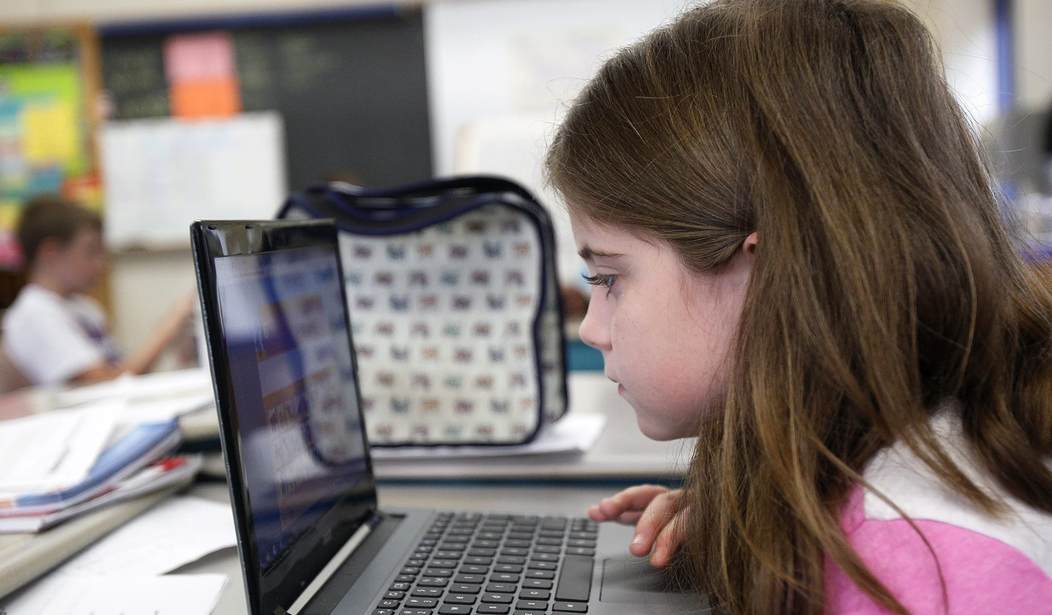Last week when I wrote about Google’s plans for spying in our homes, many commented how simple it would be to avoid the company’s peering eyes by just not buying Google products. But that’s not possible for millions of students in K-12 who are required to use Google products in their classrooms. And based on recent disclosures, Google is using their position to develop dossiers on students.
Last year almost 20 percent of all K-12 students were required to use Google Chromebooks, and more than 30 million students, teachers, and administrators used Google’s G Suite for Education. The inexpensive laptop and powerful software have become a very cost-effective solution for schools to teach computer and other skills and to communicate with the students and parents. Kids can submit their homework, take tests. check grades, and collaborate with others using these Google products.
According to an Electronic Frontier Foundation (EFF) report, these Google products also provide an opportunity for Google, the schools, and other software makers to collect students’ personal data. Essentially the products are Trojan horses used by Google to boost their advertising business.
EFF found that many schools don’t provide a written disclosure about data collection or pay much attention to the terms of privacy, and most don’t offer an alternative for the students to opt out. What that means is that students have even less protection than adults do from Google, and Google has taken advantage of the laxity, building profiles and dossiers on the students, and using them for advertising, market research, and other purposes
In numerous lawsuits, Google has admitted to doing this, including scanning and indexing student email messages and directing advertising to YouTube users under 13 years of age.
Google also acknowledged that it collects a wide range of personal information from student users who log in through its educational software. But it’s not only Google. In its survey EFF found other software companies are also collecting students’ personal data when students use their products.
- Evernote maintains copies of information on the service’s back-up server for up to a year after a user has requested that the data be deleted.
- For Haiku Learning, the schools, rather than individual students, retain the authority and ability to delete information from the application.
- Lexia Learning requires that students and parents contact the school administrator to facilitate requests to access, change, or delete personal information. Absent a request from a school administrator, Lexia retains the information for as long as the account is active or as needed for Lexia to provide services.
- Storyboard retains student data for up to four years of inactivity.
Many other companies capture personal information from students, including eScholar, Interactive Health Technologies (see below for a response from IHT) Khan Academy, Knewton, LearnBoost, LearnSprout, Moodle and Panorama Education.
Last April Google announced that it would stop scanning students’ emails and disable advertisements in their Apps for Education hosting suite and it would make updates to its Gmail Terms of Service outlining how much personal data is mined for targeted advertising. On April 30, Google caved and canceled advertising associated with the Apps for Education suite.
But violations of a student’s privacy go beyond Google, and include school employees and educators. Administrators in Pennsylvania permitted school employees to remotely access the computers while being used at the students’ homes — without their knowledge. In a similar incident, the ACLU found that some Rhode Island teachers were using school-issued computers to spy on their students.
A report from the U.S. Department of Education Office of Educational Technology — “Promoting Grit, Tenacity, and Perseverance: Critical Factors for Success in the 21st Century” — discusses how technology can be used in classrooms to monitor student behaviors using cameras, skin response, and sensors in chairs.
It described how “researchers are testing data mining techniques and physiological response data from a biofeedback apparatus that measures blood volume, pulse, and galvanic skin response to determine a students’ frustration in an online learning environment. Sensors provide constant, parallel streams of data and are used with data mining techniques and self-report measures to examine frustration, motivation/flow, confidence, boredom, and fatigue.”
In a related activity, the MIT Media Lab has even developed a device that can be used to detect moods by measuring the student’s smile.
Just imagine what Google would do if they could get access to all this data!
Students have no way to escape the high level of surveillance being conducted over everything they do in the classroom. It’s simply the natural extension of Google’s success in spying on its users. With its success in creating the largest advertising business ever, it has only encouraged many others to follow suit.
UPDATE Nov. 20, 7:56 p.m. EST: Interactive Health Technologies reached out to PJM, clarifying their data collection policy:
Our Privacy Policy clearly describes the information we collect and the steps we take to protect that information. In our Privacy Policy, you’ll see that we are one of the only education technology companies to sign the Student Privacy Pledge, a legally binding obligation to meet a series of strict standards in student data protection.









Join the conversation as a VIP Member